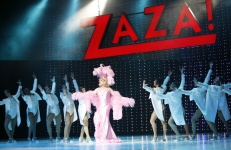 Interview with Filipe La Féria, an acclaimed Portuguese theatre director and producer and screenwriter and producer for television, with 47 years of experience in theatre and producer of shows, applauded by the public in the last 18 years.
Interview with Filipe La Féria, an acclaimed Portuguese theatre director and producer and screenwriter and producer for television, with 47 years of experience in theatre and producer of shows, applauded by the public in the last 18 years.
La Féria wrote and performed the musical “Amália”, which I’m presenting here (even though the interview is not recent and the show was first exhibited in the Politeama Theater, Lisbon in April of 2000 and later performed in various theaters in Portugal, France, Brazil, US… all with raving reviews), not only because he talks about the great dame of Fado, but also because he shares some insights on Amália, on Fado music and on his own life.
La Féria undertakes a critical posture vis-à-vis a society in which God is Money and where a reckless competition between superpowers leads each time to a bigger subjugation to the new leaders of the world. He longs for a better World, for a homeland that is a benign mother, instead of a sordid stepmother…
The show “Amália“ is the result of a wish of the diva of Fado, in seeing her life presented through the capable hands of La Féria…
It is true. Once, I read in an interview (and was surprised to know), that Amália said that she saw her life written by me. She appreciated my shows and had a great anxiety to see her life portrayed in a musical of mine. Everything was organized in order for Amália to attend the opening night, which occurred in the capital of the Madeira Island, Funchal. Unfortunately, she was not able to make it (she passed away on October 6, 1999)… but we always keep a place with flowers, in her memory.
Is this your biggest challenge?
I am a man of great challenges. My life has always been challenging. “Amália” was one of the biggest, insofar as it was very difficult because of being a very ambitious show, with a very elaborate stage setting. There are 58 actors in addition to the musicians and technicians. It was, in fact, a great challenge and I must even say a dangerous challenge. Fortunately, the public is responding in a fantastic way and filling every day the house. That makes me happy.
La Féria does not tell only a story in a musical, you model it into a multimedia show…
I always had this wish. The resource to technology helps to tell a story that develops in several places, where the narrative leaps in time. “Amália”, besides wanting to portray a lonely woman, the human being of great quality unknown to the general public, is also the history of Portugal in these last 80 years. Amália Rodrigues was born in the First Republic, lived with and for the Second Republic and watched the Carnation revolution of 1974. It was a very rich period that touched people. Besides the reunion with this extraordinary and unique character that is Amália Rodrigues, it is also the capacity of identifying with things that the public went through and that the younger generation only heard about. For example, the Englishmen like theater very much because they appreciate their history. Theater livens when people see their history portrayed in it. We are back to ancient Greece, where the Theater was the history of the “Polis” city-state. All these people that line up at the entrance, get excited and moved with the show, because it is our history, it is not only because of Amália… Amália is all of us.
Is it not a risk to represent such a recent history?
No. We have already come of age, and these 80 years of progression allows to look at our memories serenely.
Base on the biography of the Fado singer written by Vítor Pavão dos Santos, “Amália“ depicts the life of the diva of Fado in distinct phases…
Three actresses interpret “Amália”: the itty-bitty Marline, Liane which has been a great revelation, and the singer Alexandra, who turned out to be also a great actress in this show. The three amálias chosen by me represent three distinct phases. “Amália” is almost a Cinderella story: it is the little girl who sells lemons and oranges in Alcântara, Lisbon (a former industrial area that is now populated by cafes, discotheques and pubs) that later becomes a musical queen. There are thousands of people throughout the world who don’t know where Portugal is, but know who is Amália Rodrigues. It has a transversal dimension throughout the world.
Is it legitimate to say that she represents a common national identity?
I think so. The personal adventure that Amália Rodrigues endured is identified with our life itself. In fact, Amália had a great artistic quality and a great intelligence. We were lucky to live in the era of Amália … together with Maria Callas… they are unique persons. Still today, I was hearing a CD of Amália and I had the sensation that she was speaking to me. What she sings has sentiment, it has so much of our DNA, is so human that it speaks with us, even after her death, even in the past.
As a matter of fact, the history of Fado gets entangled with the life of Amália Rodrigues herself: sad, melancholic and wistful…
I define it with the words that she confided to Vítor Pavão dos Santos: she is a Cat and, like a cat, passes by things, never attaching herself to it. The last image that I have of Amália (when she came to a party) is that of a woman who had very tight shoes and asked for me to accompany her to the cab: that woman who had gathered large crowds in the Coliseum was standing completely alone. She was a poor lady with tight shoes and lonely.
In spite of having conquered the world, she was alone?
The great companion of Amália always was solitude. It happens frequently with people who are exposed very much. They come from this great abyss, represented by darkness, getting dazzled by the stage lights, and returning to their solitude, once the lights are turned off.
 Do you think that this is why this spectacle assumes a so great human and emotional form?
Do you think that this is why this spectacle assumes a so great human and emotional form?
I think so, especially because it honors people of enormous magnitude, not only Amália but Alain Oulman and Frederico Valério, as well. People have a better understanding of Amália’s Fados after seeing the show. I think that this was the secret of the show’s success about which I was well succeeded, now that I have some distancing. All the poets and composers were very much inspired in the life of Amália and my work was to seek and assemble the truthful events in Amália’s life with the Fados that she was writing or had them written to her and this involvement is perceived, although it is a poetic interpretation on my part.
Speaking of the rest of the World and in the Portuguese who live scattered around the globe, how do you see the Portuguese emigrant?
I think that to be an emigrant has its painful side, because a country that does not give its citizens good living conditions, as much as possible, is a country that has not yet achieved its purpose, hence Portugal’s role has still not been fulfilled.
Do you agree that our people are left out there forgotten and on their own?
Yes, I think that there is a great negligence. It is a very hard life, and I myself already had this experience, although in London, in the 70′s, in a time in which I had a scholarship from the Calouste Gulbenkian Foundation, but I also had to work on the same time. It is very hard and very ungrateful. We build a life, not in our land because it doesn’t understand us, but instead, it looks down on us. One of the dreams of my generation, of the people who believed in the Revolution of the 25th of April, was that the state of things would change. Unfortunately it didn’t. Each time there is more emigration, more and more people leave due to incomprehension of the country in which they were brought up in. If you stop and observe, you will see that our fields are left uncultivated. I am from the Alentejo frontier (with Spain) and I know that, even the people who live there, go to work in Spain and return in the evening. There is much room for improvement…
What would be the solution?
The solution would be not live in such a selfish society, with concentrated populations in completely stupefied megacities. Especially in a small country, not giving relevance to values other than money, demonstrating selfishness and a ruinous competition always produces undesirable results. As such, trapped in servitude to the great powers, to the multinationals and to the über bosses of the world, doesn’t seem like an attractive society, don’t you think? In a society in which God is money… God is not money…
(translated by BestInPortugal.com from TerraNatal, link to the article by Claudia Rodrigues in www.terranatal.com/notic/entrev/e_filfer_10.htm )
image credits: FilipeLaFeria.pt | CanelaeHortela.com

